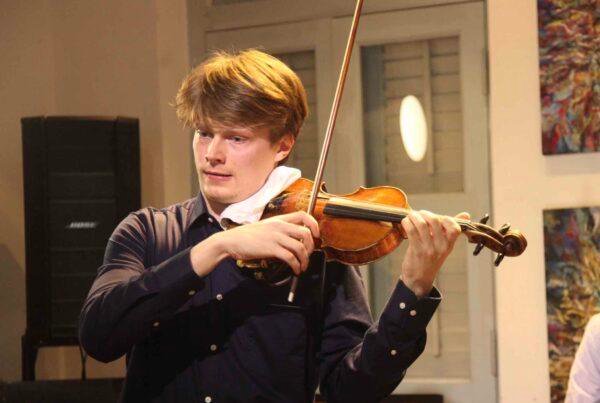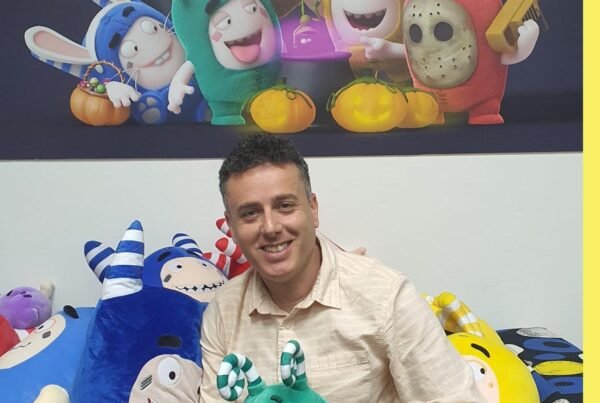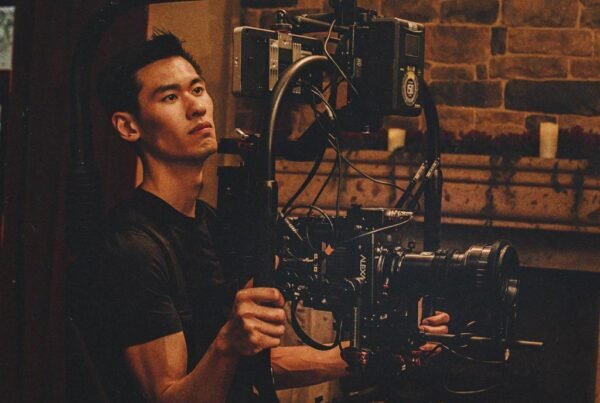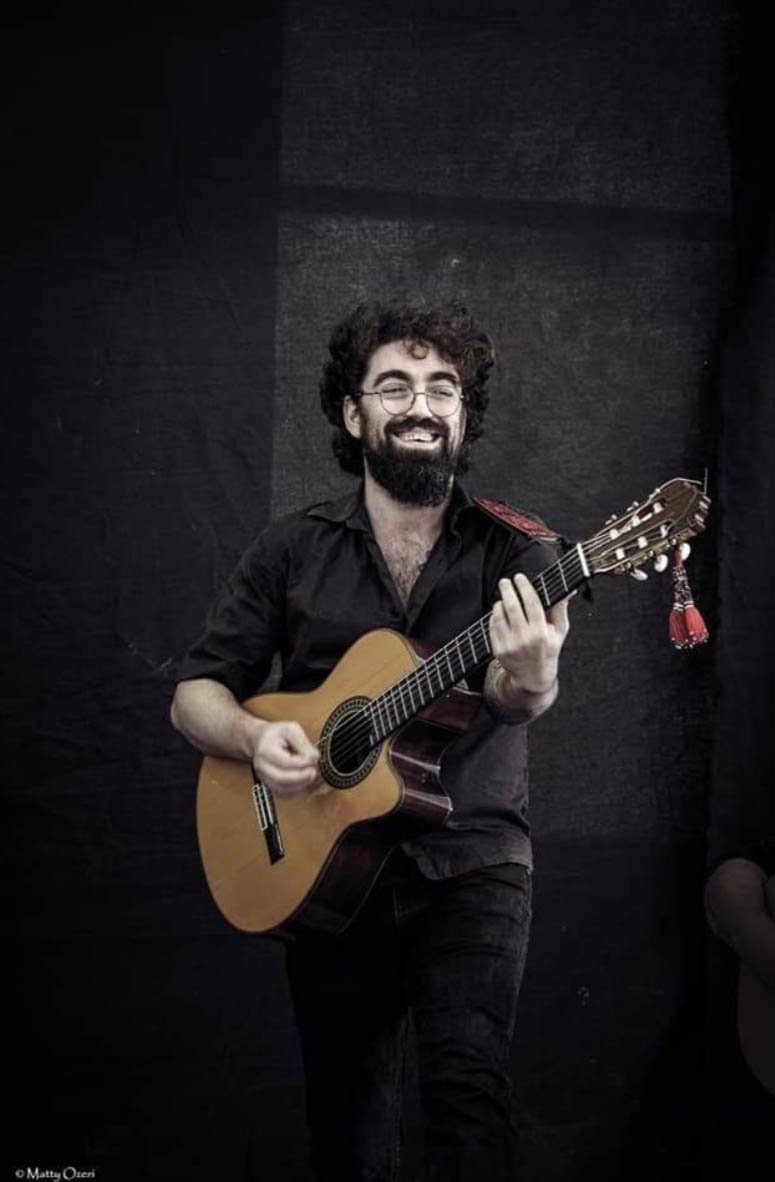
Alex Rubchinsky, Lead Singer & Guitarist for MašaAllah, talks about his career and musical endeavors throughout the years, and the importance of culture and language within music. Let’s hear more about his life story and personal anecdotes.
Q: Please briefly introduce yourself
A: Hi, my name is Alex Rubchinsky. I have been an active musician for the past 16 years and I am based in Israel, Rosh Haayin. I have also studied music professionally, [in college] my major was guitar and musicals. Since then, I have been on a lot of musical endeavors. I have had a lot of projects, a couple of bands, I’ve performed in different types of circumstances— it spans over several musical genres. So I’ve done: Bach, Reggae, Classical, Indie and Ethnic. I have also done a lot of tutoring and teaching and have been in charge of musical programs in schools. I’ve taught almost every possible age, but I really focused on children aged 7-12. That was my major line of work. I have also opened my own studio, and within it I have done a lot of interesting things. For example, recording musical soundtracks for films, jingles for commercials, records, singles and a lot of production because language is really important and I like understanding the artist. Basically all that together, spans over almost 15-20 years. Fast forward to today, I have a band called MašaAllah, and we play Gypsy music. It consists of seven musicians, starting with our percussionist, Shai “Benben” Benbenisti, who also plays the didgeridoo and all sorts of small percussion pieces, then we have a double bass player, Assaf Halperson, an Oud player (an authentic Arabic instrument, similar to the Lute), Yoram Halali. Then we have three brass players: a trumeter, Roi Aharon, a saxophone player, Elad Katz and a trombonist, Luisa Salomon. Finally, we have the Lead Singer and Guitarist, myself. I am also in charge of musical arrangements, musical conduction, pre-production and post-production, recording, mixing, mastering, composing, adapting old Gypsy music into our songs, and writing the material.
Q: How was MašaAllah formed?
A: Well every other band that I’ve had, including MašaAllah, started with an idea. Other times, it was just a pure urge to do something musical. So with MašaAllah, we found that Gypsy, was a certain genre of music that wasn’t played enough and I saw a void that I knew that I could fill.
Q: What is the purpose of MašaAllah?
A: Well it depends, because when you’re in a band— you do not necessarily need to have a musical agenda or even an ideological agenda. This is because nowadays, there are a lot of genres that don’t really carry a certain message— and this doesn’t mean that the music is not good or not worthy of listening to. In my opinion, when you have an added value like a message, then people connect more easily to what you’re trying to communicate. So, when I had my first serious band, Monte Cristo, it was all about speaking out loud, a lot of anger, a lot about speaking against corruption, hypocrisy and advocating for justice. And when you decide that this is the agenda of your band, you need to provide certain material that will be comprehensively digestible, but still approachable to most ages. So for example, you don’t want to curse a lot because that won’t convey the message. But you do want to criticize what is not good and what you believe is not good. And it’s easy when you talk about things like justice and hypocrisy et cetera, because in our world there are a lot of things to criticize. The other band I was a part of, Up N’ Down, featured a female lead singer— and she was really good. And so, girl power was the agenda. So, we wanted to make sure that she speaks out loud and that she
lets everyone know that female singers are— if not better than male singers, then at least equal. And that means carefully choosing the right songs with the right message and right attitude and vibe. The band I was a part of, Rasta Hebrew Man, which was solely Reggae, was all about peace and love, accepting others, disregarding race, nation and religious beliefs. So that was the message. With MašaAllah, there is less of an obvious message because you have to understand the roots of the music and if you look back at the roots of the Gypsy music, there’s really no message— it’s about how poor people had nothing but joy, and all they wanted to do was dance— at the time, it was denoted that they weren’t the greatest musicians but as it turns out, they actually were. So the message is, do whatever you want and do it well.
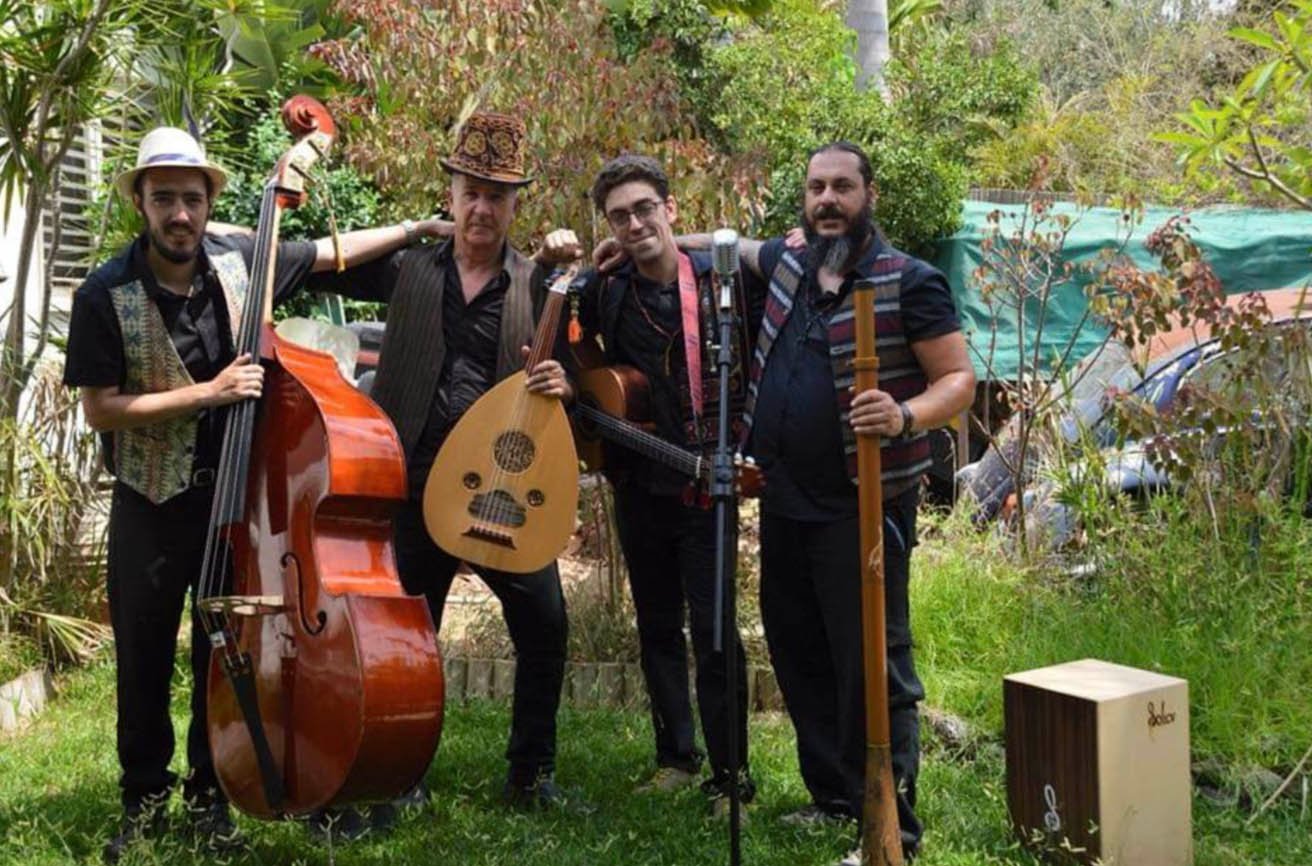
Q: What is the significance or meaning behind the name of your band?
A: We [the band] had a lot of conversations and discussions about what to call this band. And it was a really big issue for us because, for a long time, we didn’t agree on the name. And since the music is Gypsy, we needed something to define what the band is in a concise manner. So, we wanted to call it just Gypsy, Tzigane or something that said Gypsy in another language. But then, Benben suggested calling it what it is now, MašaAllah. In Turkish, this means ‘knock on wood’ or ‘everything is fine’, so it also serves a purpose.
Q: What inspired you to become a musician?
A: When I grew up, I had a piano in my room. I didn’t know how to play it, but fortunately enough, my father did. And he played me some small tunes and sang me lullabies, and I think from then on I have always had a deep connection and resonation with music
After moving to Israel, since my grandfather was a violinist, the first obvious activity to immerse me into was music. And by the age of six, I started playing violin. And then by the age of eight, I could play the piano. So, I have to thank my parents for that because they harvested and nurtured that musical part of me. And so I kept playing, and I kept trying every instrument until I got inspired. I remember when I was 12, my music teacher came into class with an electric guitar. And, that thing blew my mind away because the only time I ever saw it was on television. And then, it was right there— like in front of me. So I tried it out, and he said “No, that’s not for you.” and I was like, “No, no, no, that is for me.”
So I got inspired, and that started a whole thing with guitar. And so, I got hungry and I sought out more instruments that I wanted to play. And every instrument you pick up, gives you different types of inspiration— because it’s a language. And today, I can just pick up any instrument and become skilled at it very quickly.
Q: How has music shaped your life & what does it mean to you?
A: One of the dearest things I have closest to me besides my family and friends— is music. Simply because it is a direct representation of how you feel. And when things weren’t that great or I was in a bad place, I found the right music that would help me go through that phase of my life. I always had that record, or that band or that type of music that would either inspire me to do something and get out of that bad place or pick up an instrument and lay out all of the frustration— and it doesn’t even necessarily have to be a bad thing, like all the joy or the excitement you feel can be channeled into a positive thing with the help of music. So, that’s something that I had to discover because when I was a teenager, we didn’t have Apple Music or Spotify. You had to go and buy CDs and if you wanted to play a song you couldn’t just go online and find the sheet music for it, you had to listen to the record multiple times and find every note.
And this was really great because then you would meet someone who would find the same music and you could compare what each person found and it’s not always the same. And it enables you to talk in the same language and more importantly, it also withdraws you from reality, and places you in a world where you find a mutual interest between two people and this kind of diverts from the day-to-day routine. It’s really about finding the right music that will get you through a phase that you’re going through— either good or bad.
Q: Do you think it is important to teach youth about music?
A: I most certainly do, I think that you need to teach the youth about everything! And let the young ones decide what they like best. Because, you have to expose young people to as many activities as you can— it’s like exposing them to sports— same thing. It doesn’t necessarily mean that they’re gonna be a football player or a famous musician, but you are in a way, planting a seed. You water it a little bit and see if it grows. And one thing about children, especially the younger they are, is that their brain is like a sponge. So, they will absorb really great values and pieces of information and store it immediately, and will remember it. So with the right approach, you can instill the right values and then the child can go on to achieve really great things.
Q: Would you consider culture an important aspect in the type of music MašaAllah plays?
A: Culture is absolutely an important factor, and the beautiful thing about MašaAllah, is that each member brings their own roots from their culture. For instance, I am Russian/Moldavian, Benben is Turkish, and Yoram is Egyptian and Syrian. So, each individual brings his own musical gift that he inherited from culture, life experiences, musical endeavours and personal interests. As a result, it all blends together to create a beautiful melting pot or a salad, if you will, of cultures. That’s what makes it unique and interesting, because blending all those “ingredients” together will eventually give us something that can’t be reproduced otherwise. I think a cool way to look at it is, it’s all about balance.
So, if you have, in the same bowl, too much of the same ingredient, it can be a bit dull in taste. On the other hand, if you have too many different ingredients, it distracts from the original taste because there are so many different elements crammed together. So it really is all about balance. In my opinion, it’s way more interesting than if we were all based from the same culture. That doesn’t mean that it’s worse or better in any way, but it is certainly more interesting, because it’s always good to be exposed to something different and new, or something you haven’t been exposed to from home. And in my opinion, that’s how it serves the band well, and music is a direct result of that.
Q: What languages do you sing in and why is doing so important?
A: I sing in several different languages to better support the Gypsy style and connect back to its roots. Some of the languages I have sung in are: Hebrew, Russian, English, Italian, Spanish, Yiddish, Romanian, Greek and Gypsy Slang. But something important to note here is that, in each type of music and genre— the roots get a little mixed up when moving through generations. We try to preserve what can be preserved and we try to emphasize what needs to be emphasized. But, you can’t deviate too far from what you know and what you do. So I think, in a way, singing in different languages is preserving the roots of each culture and language. Because when we sing, for example, in Greek, then, those who speak Greek feel a sense of nostalgia and bring those back to their roots. Since Gypsy is a style, we can adapt anything we want to a Gypsy style. And some songs are definitely best as they are, untouched and simply admired. While some other songs, we can adapt slightly and make them our own, since we come from all different cultures. And regardless of whether it has been altered or added to a different style, people still resonate and connect with it because it’s their language and their music. I always kept reminding myself that music in itself, is a language, and I have to speak it the right way, with the right respect to it.
Q: What has been the most surreal moment or highlight of your career?
A: The first time I saw a full house playing my own song and then getting really good criticism after the show, that was really awesome. That was a milestone that read “You should do this”. And regardless of whatever it takes, financially speaking, because nowadays a lot of people think that if they do something they have to make money off of it. Which is not always necessarily true. It’s great if you can make money off of it, but it’s not always the case. And this doesn’t mean that you’re not worthy of pursuing that ambition or passion. So, that moment most definitely told me, “Dude, you’re on the right track.” and “You should keep going on this path.”
Q: What struggles have you faced as a band?
A: That’s a very tough question because musicians are divided into two categories.There are people who say “I’m a professional musician, and I need to get paid for what I play.” And that’s perfectly fine— it’s understandable and that’s their right. But not everyone can reimburse every player at every show at every time. Because when you start a band, not every band automatically makes money off their music, it takes quite a long time to be profitable. So that’s a really tough thing when you start a band, to find the right people, who will share the will and musical vision of what you want to do. Getting the majority of the material is challenging as well as organising and arranging it and making it unique. But when you have the right people, that’s fairly easy, because you have the right material to work with.
Q: What are some of your tips and/or words of wisdom for aspiring musicians or new bands?
A: They should just go for it. There’s nothing to be ashamed of if you fail, you will always fail at different things in life. But musically speaking, just go for it. I myself have failed a lot of times and I am pretty sure I am going to fail some more. So, as cliché as it sounds, never give up. Aspiring musicians should just remember to choose what they want to do and what makes them feel good and try not to please anyone. Because haters are going to hate and people are going to tell them not to play and not to sing, “This is not good.” and “This is not going to make you money.” or “This is not going to make you famous.” Et cetera. Aspiring musicians need to set their purposes straight, and go for it. If they want to be famous, that’s one thing. I myself don’t know the formula of how to be famous. All I know is how to be happy. Because, I really don’t think fame is important. When people talk about music, it’s all about feelings and making others feel good. So they should not give up, I think that’s the best piece of advice. I think they should learn, I think they should— if they want to succeed— put in the work, invest time, and practice.
Q: What are some exciting projects that are currently in the works?
A: Disregarding COVID-19 and any other encumbrance on the way, we are currently working on our debut album— which will consist of both cover material and original material. And we will be performing quite a lot, because without a performance there’s really no connection to the crowd and you can’t spread out the word and let people really feel your music. So we are really looking forward to that. So, stay tuned!
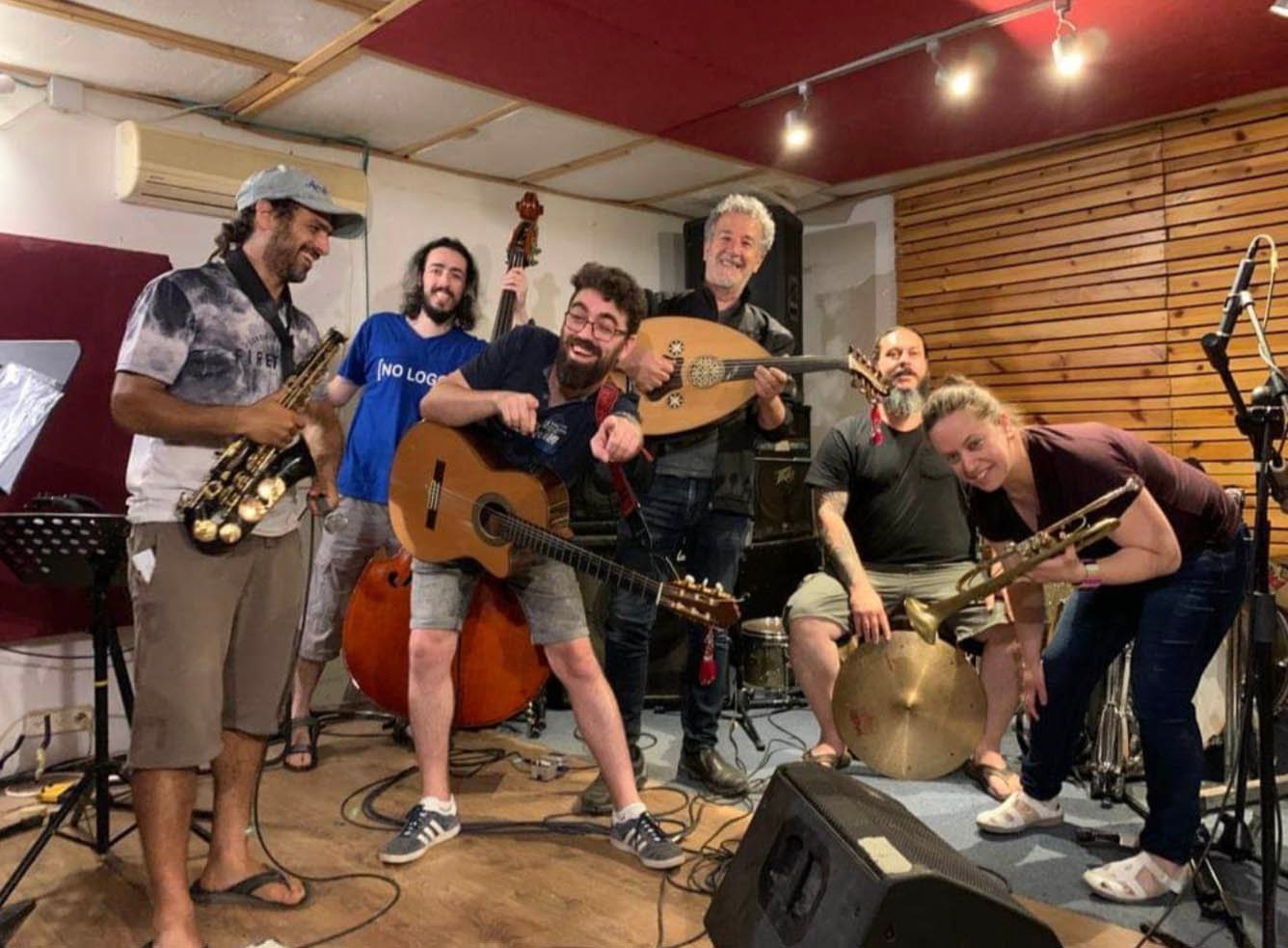
Q: What does the future look like for MašaAllah?
A: Well quite frankly, I never know what is going to happen. It could fall apart within a day. But I am fortunate enough to know that whoever is in that band wants to be there. And they want to be there regardless of everything we spoke about. So, I believe that given the circumstances, if we are allowed to perform and create music, then we will do it as much as we can. So, I believe that is going to happen because I stand by my words, I am not giving up. And, if for some reason it doesn’t work out with MašaAllah, then there will be something else. I am always working on several projects, so I have the band and I am also simultaneously recording my own original material. So I have something to perform other than that, not because I don’t believe in the band, but I believe you have to let something go, to clear the space and it will enable other opportunities to grow. So, I hope I have many projects this year! And I think, in a matter of a couple months, I will be able to say that I have completed my first album. So that’s really exciting and I am looking forward to it being released and for people to listen and enjoy our music.
After meeting with Alex and speaking to him about his insights, it was clear that music and performing are very near and dear to his heart. MašaAllah can best be described as an up and coming funky, authentic and solacing band with an intelligible focus in Gypsy music. Stay tuned for the release of their debut album by keeping up to date on their social media platforms, @masaallahmusic on Instagram and Facebook. If you are ever in Israel and looking for some entertaining music events to attend, be on the lookout for upcoming events that host MašaAllah!


